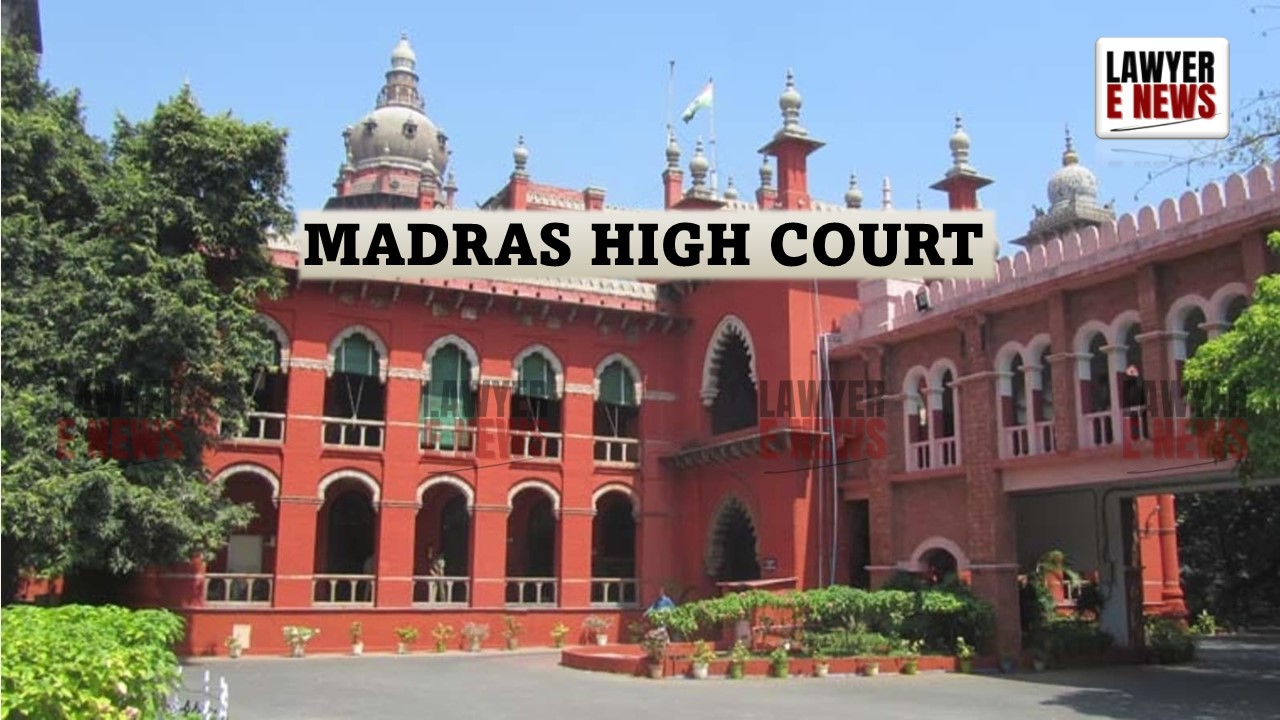-
by Admin
16 February 2026 1:47 PM



Madras High Court, in Criminal Appeal No. 130 of 2019, dismissed the State's appeal challenging the acquittal of Ponnuvel, who had been charged with the murder of Chandran and causing hurt to Kanniyammal. The appeal sought to overturn the decision of the Additional Sessions Court, Kancheepuram, which had acquitted the accused, citing doubts about witness credibility, delays in medical treatment, and FIR registration. The Court reaffirmed the Trial Court's judgment, noting that the prosecution had failed to prove the charges beyond reasonable doubt.
"Presumption of Innocence Reinforced Upon Acquittal"
The High Court emphasized that the presumption of innocence, already strong during a trial, is reinforced after an acquittal, and it requires compelling reasons to interfere with the Trial Court's findings. The Court held:
“If the view of the Trial Court is a legally plausible view, mere possibility of a contrary view shall not justify the reversal of acquittal.”
The Court concluded that the Trial Court’s findings were based on reasonable doubt regarding the presence of key witnesses and inconsistencies in the prosecution's case, particularly concerning the delay in medical treatment and FIR registration.
The State appealed the acquittal of Ponnuvel, who was charged under Sections 324 and 302 of the Indian Penal Code (IPC) for assaulting Chandran with a wooden log, causing his death, and injuring his wife, Kanniyammal, during a quarrel over a property dispute. The incident occurred on April 1, 2014, when Ponnuvel allegedly struck Kanniyammal and later attacked Chandran when he intervened, leading to Chandran's death.
The prosecution relied on PW1, the son of the deceased, and PW2, Kanniyammal, as key witnesses. According to the prosecution, both were present at the scene of the crime. However, the Trial Court found inconsistencies in their testimony, raising doubts about their presence during the incident.
The High Court highlighted significant delays in the case, noting that the FIR was registered late and that there was an unexplained delay in providing medical treatment to PW2. The Court observed:
“The delay in registering the FIR and providing treatment to the injured eyewitness created reasonable doubt regarding the sequence of events.”
Additionally, the non-production of accident records from Uthiramerur Hospital, where PW2 allegedly received first aid before being referred to Chengalpattu Government Hospital, further weakened the prosecution's case. The Court agreed with the Trial Court’s finding that the absence of these records suggested possible suppression of evidence.
The High Court found that the testimony of PW1 and PW2 was inconsistent, especially regarding how they traveled to the hospital and their actions following the incident. PW1 claimed that his mother was taken to the hospital by ambulance, while PW2 stated that she traveled in an auto. The Court found this discrepancy to be critical, especially when combined with other inconsistencies in their account of the events.
“The Trial Court’s finding that the witnesses' conduct was unnatural was upheld. If really there was an occurrence as stated by the prosecution, leaving the deceased, who was struggling for his life, at the scene of occurrence, would not have happened.”
The Court noted that PW1's inaction during the alleged attack on his father and his decision to prioritize medical treatment for his mother raised doubts about his presence at the scene.
The Court further observed that the evidence provided by PW6, another eyewitness, was largely hearsay, and his account did not directly support the prosecution’s version. The Trial Court had also noted that the postmortem report indicated that Chandran could have survived for two hours after the attack, making it unlikely that PW1 and PW2 would have left him without seeking immediate help. This cast further doubt on their presence at the scene of the crime.
The High Court agreed with the Trial Court that the non-production of medical records from Uthiramerur Hospital raised serious concerns:
“The absence of the accident register of Uthiramerur Police Station and the long delay in giving treatment to PW2 definitely create a reasonable doubt.”
The Court found that the failure to submit these critical documents, which could have provided a spontaneous account of the incident, indicated that the prosecution’s case was not reliable.
In its judgment, the High Court reaffirmed that the prosecution's case was riddled with inconsistencies, including the absence of key medical records, conflicting witness testimonies, and the unnatural conduct of PW1 and PW2. The Court emphasized that the principle of reasonable doubt applies more strongly in cases of acquittal:
“A reasonable doubt is one which renders the possibility of guilt as highly doubtful.”
The Court held that the Trial Court’s doubts were reasonable and based on plausible reasoning. It cited the Supreme Court’s ruling in Mallappa v. State of Karnataka [(2024) 3 SCC 544], which reinforced the principle that appellate courts should not interfere with acquittals unless the trial court’s findings are manifestly perverse or unreasonable.
The Madras High Court dismissed the State’s appeal and upheld the acquittal of Ponnuvel, finding no compelling reason to interfere with the Trial Court's decision. The Court held that the prosecution failed to prove the case beyond reasonable doubt and that the Trial Court’s findings were based on plausible and reasonable grounds.
Date of Decision: 17 October 2024
